-
Featured Items
-
Featured Resources
 Funding & Grants
Don't miss out on funding opportunities. Stay informed with our up to date online listings and email notifications.
Read More
Funding & Grants
Don't miss out on funding opportunities. Stay informed with our up to date online listings and email notifications.
Read More
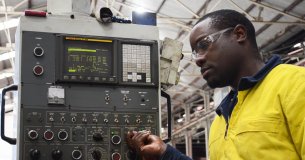 Skilled Migration
Our services help both applicants and employers, to learn more, develop plans, submit applications, and settle in.
Read More
Skilled Migration
Our services help both applicants and employers, to learn more, develop plans, submit applications, and settle in.
Read More
 Research and Analysis
Good research and analysis makes the case. How can our resources and services help your project or application?
Read More
Research and Analysis
Good research and analysis makes the case. How can our resources and services help your project or application?
Read More
 Information & Data Resources
With resources like REMPLAN, Regional Knowledge Base, and decades of data, discover how we can help your project.
Read More
Information & Data Resources
With resources like REMPLAN, Regional Knowledge Base, and decades of data, discover how we can help your project.
Read More
-
Stay InformedSubscribe to one or more of our regular email subscriptions, to be kept up to date on news and funding opportunities for the region
-
-
Our Region
- Our Region
- Regional Plan
- Regional Data
- Current Regional Issues
- Population Migration Analysis for 2016-21
- Job Vacancies Continue at All-Time High
- National Debt - What it Means for Our Economy?
- The True Value of Home Solar
- The Economic Impacts of Local Government Amalgamations
- State of the Regions Report 2014-15
- Antifragility - A different take on regional economic development
- Biohubs - Collaborative Waste Management
- Attracting New Residents
- Socio-Economic Impacts of the Murray Darling Basin Plan
- Murray Darling Basin Water Recovery
- Growing Businesses
- The Northern Inland Economy
- Geographical Overview
- Major Industry Sections
- Our Services
- Grants and Funding
-
Skilled Migration
- Skilled Migration
- Skilled Employer Sponsored Regional Visa
- Skilled Work Regional Visa (subclass 491)
- Temporary Seasonal Workers
- Designated Area Migration Agreement (DAMA)
- Helpful Information for Visa Holders
- Information for Employers
- Case Studies
- Payment Details
- Advice & Further Information
- Contact Details
- News & Events
-
Our Projects
- Our Projects
- Current Projects
- The Welcome Experience
- Come On Inland
- Wool Works - Wool Training Schools
- Skilled Migration
- Metal Works - Welding and Fabrication Schools
- Stories of Resilience
- Alt Brothers Beekeeping - Glen Innes
- Carelle's Toy Store - Glen Innes
- Greenhill Orchards - Arding
- Gwydir Meats - Warialda
- Kaputar Motors - Narrabri
- Moonbi General Store - Moonbi
- Sandstock - Tingha
- Sherelle Fashions - Tenterfield
- Sleepy Merino - Inverell
- Tenterfield Chamber of Toursim, Industry and Business - Tenterfeild
- The Welders Dog - Armidale
- Walcha Veterinary Supplies - Walcha
- AGCAP - Agribusiness Careers & Professions
- Northern Inland Regional Investment Profile
- Past Projects
- Digital Economy Strategy
- Business Growth Project
- Go Digital
- How to Start an Online Business
- Create Your Website Using Squarespace
- How to Edit Your Squarespace Site - Part 1
- How to Edit Your Squarespace Site Part 2
- Add a Shop to Your Squarespace Site
- Start a Blog and Find out What Customers are Searching
- 14 Tips For a Better Blog Post
- Which Social Media Platforms are Best for Your Business
- How to Use Facebook Effectively For Your Business – Part 1
- How to Use Facebook Effectively For Your Business – Part 2
- Instagram Tips for Business
- Catching Up, More Instagram & Dealing with Haters
- Getting Started with Twitter for Business
- Social Media Scheduling Tools
- How to Start an Etsy Shop – Part 1 – Research
- How to Start an Etsy Shop – Part 2 – Signup
- Online Security for Your Business
- Product Photography and Website Images: Your Guide
- 5 Tips to Improve your Productivity in your Business
- Best Online Business Resources
- How to Improve Your Communication Skills and Win More Clients
- NBN Coordinator
- Putting Power Back in the Regions
- Road Freight Study
- Town Audit Benchmarks
- Food and Wine
- Youth Survey
- Digital TV Switchover Assistance
- Northern Inland Transport Guide
- Live.Train.Work
- Northern Inland Innovation Awards
- Northern Inland Innovation Awards - 2017
- Northern Inland Innovation Awards - 2016
- Northern Inland Innovation Awards - 2015
- Northern Inland Innovation Awards - 2014
- Northern Inland Innovation Awards - 2013
- Northern Inland Innovation Awards - 2012
- Norther Inland Innovation Awards - 2011
- Prime Super Northern Inland Innovation Awards - 2010
- Prime Super Northern Inland Innovation Awards - 2009
- Northern Inland Innovation Awards - 2007
- Northern Lights Project
- NBN Smart Home
- Murray Darling Basin
- Moree Plains Business Workshops
- Namoi Investment Prospectus
- Industrial Land
- Bioenergy and Local Electricity Retailing
- Northern Inland Business Energy Assessment
- Skills for the Future
- Impacts of COVID-19 on Businesses
- Past Projects of NIRDB
- Aboriginal Employment and Enterprise in the Gunnedah Region
- Art as an Industry
- Aviation Survey
- Farm Forestry - Northern Inland Forestry Investment Group
- New England North West Film Strategy
- Northern Inland Excellence in Business Awards
- Food and Wine 2003 - 2008
- Prime Super Northern Inland Innovation Awards 2009
- Regional Business Networking Program
- Regional Leadership Course 2008
- Viticulture Strategy 2002-2003
- About Us
- Contact Us
- Other Resources
- Privacy and Legal
- Search
Back to Newsletters
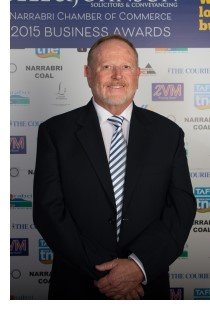
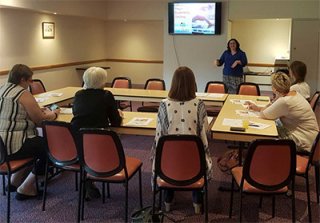
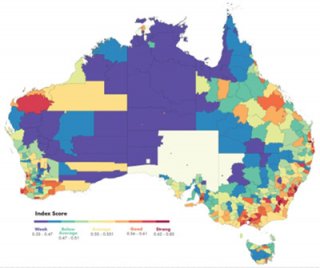
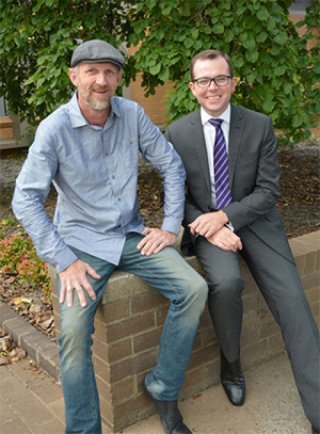

April 2017 Newsletter
Tuesday 2nd of May 2017
In this Issue:
- Welcome from the Chair
- Go Digital? Yes, They Can!
- Metro-Regional Education Gap
- Smart Incubator Welcomes First Tenant
- Vital Recognition for Tradie Stars of Tomorrow
- Smart Cities and Suburbs Program
- Sapphire Windfarm Under Construction
- Aboriginal Business Information Session in the Region
- Grants and Funding Opportunities
- What's On in the Northern Inland
Welcome from the Chair

Dear Northern Inlanders,
Welcome to the April edition of our monthly newsletter. Our Go Digital workshops are now well underway, with extra demand meaning we are scheduling further sessions.
Those of you who travelling the New England Highway cannot have failed to notice the huge wind-turbine components being transported to the Glen Innes/Inverell areas for the Sapphire Wind Farm, one of several large-scale renewable energy developments which is positioning our region as a national leader in renewable energy generation.
Also of note, the University of New England's SMART Region Incubator has commenced with its first tenant located in the premises. We regard this type of initiative as crucial to diversifying our regional economy, attracting highly-skilled people whose product sales will have a significant economic multiplier effect on the region, and help smooth out the fluctuations associated with economies which are heavily reliant on commodity sales.
Regards,
Russell Stewart
Chair
Go Digital? Yes, They Can!

Tiffany Gilleland presenting a recent Go Digital workshop
Regional Development Australia Northern Inland (RDANI) extended a digital helping hand to businesses in the region needing to improve basic website and social media skills. The Go Digital project has attracted strong interest, with close to 100 businesses, individuals and organisations now signed up for the free course. Due to demand, additional workshops are planned; the first has a Facebook focus and is taking place in the Uralla Community Centre on Wednesday 3 May, at 5:45pm. Anyone wanting to attend this free workshop should contact Tiffany Gilleland on 02 67710700.
Funded by the Murray-Darling Basin Regional Economic Diversification Programme, the GoDigital project saw free face-to-face workshops conducted in the following 12 Local Government Areas: Armidale Regional; Glen Innes Severn; Tenterfield Shire; Uralla Shire; Walcha, Tamworth Regional, Liverpool Plains Shire; Gunnedah Shire; Narrabri Shire; Moree Plains Shire; Inverell Shire and Gwydir Shire Councils.
Tiffany Gilleland has a wealth of experience in social media and has had extremely positive feedback from attendees of her Go Digital workshops. “We are showing people that yes, they can Go Digital; it is not as complicated as they thought,” she said.
The project also features online educational material, Q&A sessions held by Webinar, step-by-step instructional videos, as well as ongoing support over a six-month period. The online course is in a modular format and participants have the freedom to select the sections they require, or go through all of the content.
“RDANI identified a need for digital upskilling in the region, with smaller operators keen to have the ability to sell their goods and services online through a fully-functioning and easy-to-use e-commerce website,” Tiffany said. “Locals are recognising that they can harness social media to advance their business. It is rewarding to show them that they can Go Digital and how simple it can be.”
Go Digital course material covers practical subject areas, from an introduction to online business, to building a website, building business with blogs and social media and trading online. “It doesn’t matter if you could not make it to a workshop in your area. It is not too late to sign-up!” Tiffany said.
“The Go Digital Project is equipping Northern Inland businesses with the skills to trade online for the first time, while others will have new digital skills that yield positive results,” she said.
To sign up for the online course or attend the upcoming Uralla workshop, contact the Regional Development Australia Northern Inland office on 02 6771 0700 or email: tgilleland@rdani.org.au
Metro-Regional Education Gap

The Regional Australia Institute’s Human Capital Index conveys important data, reflecting an alarming metro-regional divide in population skills and education.
“Whether you’re 8 or 88, if you’re in a regional area we want you to be engaged in learning,” is the key message from Regional Australia Institute CEO Jack Archer, in light of the Government’s announcement of an Independent Review into Regional, Rural and Remote Education. “Australia is on track to have the most segregated education system in the OECD: where a person lives is now second only to socioeconomic status as a determinant for success.”
Mr. Archer said that a culture of continuous education and training is needed. “Technology change and job mobility means the concept of one-time education completed early in life is fast becoming obsolete. A two-speed education system compounds existing health, opportunity and income gaps in regional areas.”
Regional Development Australia Northern Inland Chair Russell Stewart agrees with this sentiment but said that there is no need to be alarmist and re-invent the wheel. “The Agribusiness Careers and Professions program (AGCAP) is a regionally developed rural career kickstarting success story. We need to support practical approaches that are proven to really work to upskill and retain quality young people in the regions,” he said.
The Regional Australia Institute’s [In]Sight-Human Capital Index, looks at educational development across ages and stages on a region by region basis.
Key data from the Index shows that as it stands:
- Based on NAPLAN results, regional areas perform significantly lower than their metropolitan neighbours in both primary and secondary numeracy and literacy;
- The proportion of young regional Australians (aged 15-24) not engaged in either education or employment is 44% higher than metropolitan areas; and
- This divide carries through to post-secondary education too, with 9% fewer Australians in regional areas university qualified.
“The diversity of regional strengths and weaknesses means that while our standard schools funding debate, VET or university reform options can contribute, on their own each will fail to solve the problem of the regional divide.”
Human Capital describes the skills and capacities that reside in people that are put to productive use. It represents the value of the skills, knowledge, talents and abilities of people and their potential to drive innovation and economic growth.
The update of the [In]Sight Human Capital Index focusses on development through the lifecycle, firstly during early childhood, the acquisition of foundational skills of literacy and numeracy in primary and secondary school, completion of high school, and attainment of further skills in technical and university-level qualifications.
It also provides a measure of the extent to which young people are learning or earning, and a measure of adult learning. Finally, for each region, an overall assessment of the skill level of the engaged workforce is provide.
The most alarming finding from the updated index is the continued disparity between regional and metropolitan Australia. Across Australia, few regional LGAs perform as strongly as metro areas in terms of Human Capital measures. This deficit places regional Australia at a clear disadvantage to the rest of the country in terms of responding and adapting to structural changes reshaping the nation’s economy.
Inequitable access to services as well as limited employment options for regional Australians have left them with a significant handicap. It’s not only a shortage of formal education services, but also non-traditional forms of training like job readiness or upskilling programs. Most of all, it’s poverty of opportunity. And the more remote you get, the wider the gap becomes.
Left unaddressed, this glaring disparity is likely to only grow, from a gap to a chasm. Metropolitan areas not only occupy the top ten performing regions overall (Table 2), but also make up 83 of the top 100 regions. Only a few regional areas like Hobart (27), Queenscliffe (72), Armidale (84) and Roxby Downs (94) crack the top 100 performing regions.
For more information please refer to the following websites:
www.regionalaustralia.org.au/home/2015/11/human-capital/ and www.regionalaustralia.org.au/home/tools-and-products/insight/
Smart Incubator Welcomes First Tenant

Member for Northern Tablelands Adam Marshall meets with New England Avionics founder and incubator tenant Scott Hamey
Innovation is vital to regional development and RDANI’s Northern Inland Innovation Awards recognises that and now it being nurtured in an incubator. Locally based drone company New England Avionics has become the first resident of Armidale’s University of New England SMART Region Incubator – and has wasted no time getting straight to work.
Created by the University of New England with the assistance of the NSW Government’s Boosting Business Innovation Program, the Incubator provides a high-tech space for entrepreneurs to bootstrap startup tech companies. New England Avionics is the first company to move into UNE’s Armidale campus.
Northern Tablelands MP Adam Marshall said the agribusiness and technology company had already booked out a two-day crash course on applying the technology in an agricultural setting.
“Fully funded by the NSW Government, 40 students will be provided a technical briefing, as well as flight training and an overview of legal responsibilities in Australian airspace,” said Mr Marshall. “In no time at all, New England Avionics has demonstrated the immense demand for quality, local multirotor training.
The SMART Region incubator is designed to help fledgling entrepreneurs with research and business development. It provides UNE researchers with a practical application for their abilities, and companies can confer with the best minds in the business. This is a mutually beneficial relationship between academics and industry, which will ensure the New England continues to be a hub of innovation in agriculture.
New England Avionics will host the two day course in May, with plans for another in the 3rd quarter of this year.
Vital Recognition for Tradie Stars of Tomorrow

Member for Tamworth Kevin Anderson has announced 79 nominations have been received for the region’s annual celebration of the best local Vocational Education and Training (VET) talent.
"The New England Region Training Awards (on Friday, 23rd June 2017) is a fantastic opportunity for students, parents, employers, teachers and trainers to celebrate the very best VET talent we have,” he said. “Regional winners go on to compete at the State Final in September, and the winners there go on to compete for NSW at the National titles.”
Deputy Premier and Minister for Skills, John Barilaro, said that students, parents and employers are increasingly recognising the incredible value of vocational training in creating new and exciting pathways to rewarding careers and employment for people throughout the State. “These Awards represent the highest level of recognition for apprentices, trainees and the teachers who participate in VET and celebrate the outstanding effort that thousands of individuals, employers and training organisations put into VET each year in NSW.”
Skill shortages remain a major regional issue and Regional Development Australia Northern Inland conducts and supports a number of programs that work to address them. “VET awards are a fantastic way to not only celebrate those who excel in their trades training but also to encourage them and promote trades career paths,” Chair Russell Stewart said.
For more information on the awards: www.training.nsw.gov.au
Smart Cities and Suburbs Program
Regional Development Australia Northern Inland Chair Russell Stewart has welcomed a new opportunity for Northern Inland communities to show and build on how smart they are, on a national level. “I want to see this region well represented and standing tall in the Smart Cities and Suburbs Program. Let’s work together and attract funding for the Northern Inland.”
The Assistant Minister for Cities and Digital Transformation, the Hon. Angus Taylor MP, announced the launch of round one of the Smart Cities and Suburbs Program on 17 March 2017.
The $50 million program supports local governments, private companies, research organisations and not-for-profit bodies to work collaboratively and deliver innovative smart city projects. The goal is to improve the liveability, productivity and sustainability of cities and towns across Australia.
Applications for round one are open until 5:00pm AEST on the 30th of June 2017.
More information and program guidelines for round one are available on business.gov.au.
A list of example smart city technologies, applications and projects providing an indication of the types of initiatives that may be eligible for funding under round one of the program can be found here.
Local governments that are new to smart cities and smart technology can register for the Future Ready incubation series. The series complements the program and builds smart cities capability. More information and registration details are available on the Future Ready page.
The Smart Cities and Suburbs Program guidelines were developed following extensive national consultations with stakeholders.
Public consultation on draft guidelines took place between 13 December 2016 and 20 January 2017. More than 50 submissions were received.
The development of the draft guidelines was informed by stakeholder input provided at consultation roundtables held nationally in September and October 2016. More than 550 representatives from state, territory and local governments, technology companies, not-for-profits and research organisations attended 11 roundtables held in every state and territory.
Sapphire Windfarm Under Construction
Work has commenced on the largest wind farm project in NSW – Inverell’s Sapphire Wind Farm. The first of 75 wind turbine bases required a 600 cubic metre concrete pour (approximately 100 truckloads).
“After the Moree Solar Farm, White Rock Wind Farm and the Zero Net Energy Project in Uralla, this really cement’s the Northern Inland region’s place as a national leader in the renewable and sustainable energy sector,” Regional Development Australia Northern Inland Chair Russell Stewart said.
The 134-metre high turbines in the Sapphire Wind Farm will generate 270 megawatts of electricity, enough to power around 110,000 each year.
The company behind the project, CWP Renewables, has undertaken extensive consultation with landholders and stakeholders in the area.
Constructed is not expected to be complete until mid-2018 but the first power generation is expect in January, 2018.
Aboriginal Business Information Session in the Region
Indigenous Business Australia (IBA) is holding free info sessions across the country with Aboriginal and Torres Strait Islander people who want to talk more about running their own businesses.
If you have an idea for starting a business or are just thinking about it, these three-hour sessions may be the perfect place to start.
Discussion topics include:
- What is business?
- Why go into business?
- Do I have what it takes?
- How can IBA assist?
Date: Thursday 11 May 2017
Time: 9.00am - 12.00pm
Where: Jobs Australia Enterprises LTD
104 Beardy Street, Armidale
To RSVP, call 1800 107 107 and ask to speak to Niel Barry or Jamie Day.
Grants and Funding Opportunities
Renewable energy funds for Councils
The Office of Environment and Heritage’s Regional Clean Energy Program (RCEP) creates opportunities for regions and communities throughout New South Wales to fully participate in local renewable energy initiatives.
Working closely with industry, local governments and other stakeholders, the program ensures these communities receive the necessary information and resources to understand and evaluate renewable energy options for their long-term social, economic and environmental benefit.
Aside from promoting the technology and advantages of wind, solar, biomass, geothermal, wave, tide and other clean-energy sources, the program provides funding to develop community-based projects. It also includes identifying and accessing relevant programs and information for regional NSW needs.
Investing in Women 2017
Closes 24 May 2017
Up to $25,000 per grant.
Available for organisations that demonstrate innovative projects aimed at engaging and supporting women, including: women living and working in regional NSW; Aboriginal women; young or older women; women living with disabilities; women from culturally and linguistically diverse (CALD) backgrounds.
Leadership in Agricultural Industries Fund
Closes 12:00 (noon) Canberra Time 17 May 2017
Between $100,000 and $500,000 per grant
Total Pool: $5,000,000
The Fund’s objective is to support national agricultural industry organisations to develop leadership capability within agricultural industry representative bodies. It aims to build farm leaders’ skills so they can better represent their agricultural industry.
Ignite Career Fund
Closes 16 March 2017
Up to $5,000
Total Pool: $25,000
The Ignite Career Fund supports individuals working in the publishing and visual art sectors to develop skills and progress their careers.
Community Development Grants Programme - Department of Infrastructure and Regional Development
Closes 30 June 2017
$9,000 - $13,000,000
Available to Businesses, Not for Profit and Schools for the infrastructure required to promote stable, secure and viable local and regional economies.
Aboriginal Benefits Foundation Grants
(Ongoing)
$500 - $5,000
Available to Aboriginal communities and individuals for projects in line with the Foundation’s goals.
Community Led Grants - Australian Government
Ongoing
Amount Undisclosed
Available to Not for Profit organisations or individuals in the Aboriginal or Torres Strait Islander community for projects in the areas of Education, Employment and Economic Development and / or Community Safety.
Social Enterprise Development and Investment Funds (SEDIF)
Ongoing
Amount Undisclosed
Available to social enterprises to help them grow their business and impact more people with the result of their work.
Sponsorship Grants - Multicultural NSW
Ongoing
Amount Undisclosed
Available to Not for Profit organisations to support initiatives promoting community cohesion and the benefits of a multicultural society.
Innovation Connections
Ongoing
Up to $50,000
Available to businesses to connect them with an Innovation Facilitator to help identify knowledge gaps and opportunities to grow their business
What's On in the Northern Inland
Australian Celtic Festival
Thursday 4th to Sunday 7th of May
Glen Innes
Go Digital Follow Up Workshops
Facebook
Wednesday 3rd May
Uralla Community Centre, 5:45pm
TBA
Wednesday 17th May
Uralla Community Centre, 5:45pm
UNE Open Day
Friday 5th May
UNE, Armidale
Narrabri Show
Friday 5th May
Narrabri Showground
19th Annual Vintage Machinery & Miniature Railway Rally & Swap Meet
Saturday 6th - Sunday 7th May
Quirindi Rural Heritage Village (Kamilaroi Highway)
Great Nundle Dog Race
Sunday 7th May
Nundle
IBA Free Business Information Session
Thursday 11th May
9:00am - 12:00pm
Jobs Australia Enterprises Limited
Armidale
2017 CAN Assist Masquerade Ball
Saturday 13th May
West Tamworth Leagues Club
57th Grafton to Inverell Cycle Classic
Saturday 13th May
Glen Innes and Inverell
Currabubula Red Cross Art Show
Thursday 18th May
Currabubula Hall
RSPCA Million Paws Walk
Sunday 21st May
Inverell
Webers Circus
Thursday 25th to Sunday 28th May
Armidale
Author Karly Lane
Friday 26th May
Bingara
New England Cattle & Yard Dog Championships
Friday 26th to Sunday 28th May
Armidale
The Lunatic Festival & Fun Day
Incl. Westpac Helicopter Fundraiser
Saturday 27th May
Tenterfield
Related Pages







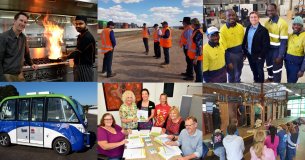 Latest News
Latest News
